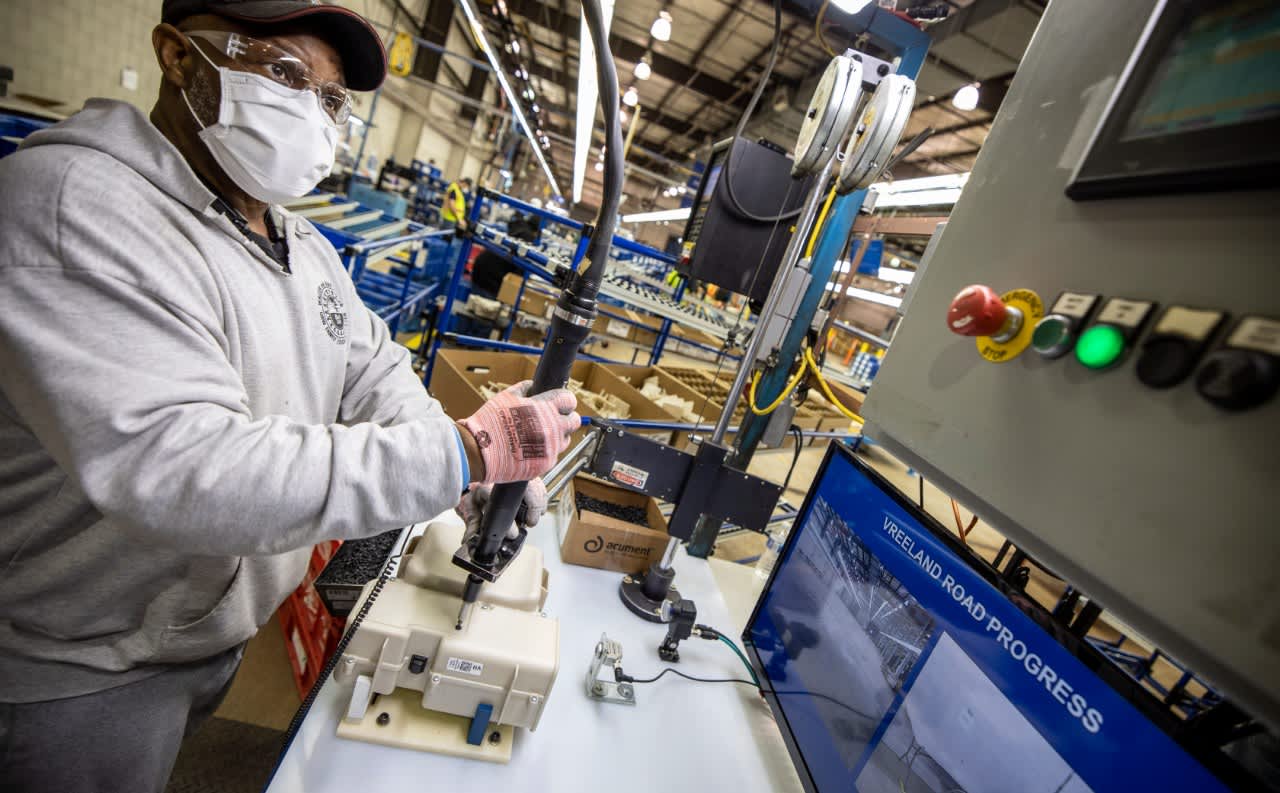Coronavirus safety actions for Ford include required face masks for everyone entering a Ford facility. Every Ford team member will be provided a care kit including a face mask and other items to help keep them healthy.
Ford
U.S. auto plants weren’t supposed to be closed this long due to the coronavirus pandemic. When the factories began shutting down in March, some automakers only expected the closings to last days, potentially weeks.
But despite costing automakers billions, the majority of auto plants were closed through April and reopening dates remain a moving target for an industry that thrives on certainty and precision.
Issues to reopening auto manufacturing, which makes up 6% of the U.S. GDP, range from obvious ones such as worker safety and abiding by local mandates – something Tesla CEO Elon Musk colorfully discussed earlier this week – to internal problems of supply chain logistics and supplies.
If one of the tens of thousands of parts in vehicles isn’t available, companies can’t produce and ship cars and trucks. Toyota Motor this week cited an “extensive review” with its suppliers and logistics network as reasons for delaying its plans to restart plants from Monday to the week of May 11.
“It’s extremely complex,” Ford Motor Chief Operating Officer Jim Farley said Thursday about the process to reopen the company’s operations globally.
Farley, speaking with reporters on a conference call about reopening plants, said “it’s critical that we get this restart right.” A false start could further set the industry back, endanger lives and complicate matters even more.
“We’ve gone through so many things as a company for over 100 years, but this is really unprecedented,” Farley said. “We have so much manufacturing shutdown at one point.”
Restart dates
Ford as well as General Motors and Fiat Chrysler are among the automakers to not yet announce a restart date following delays to previous restart dates. The automakers, unlike their foreign counterparts, have to negotiate the openings with the United Auto Workers union, which opposes an early-May reopening.
Several automakers could beat the Detroit automakers to production. Daimler became one of the first companies to begin producing Mercedes-Benz models this week in Alabama. It ceased production at the plant on March 23.
Others such as Hyundai Motor, Kia Motors and BMW are expected to restart plants beginning Monday. Nissan Motor, which has delayed its restart plans at least twice, is expected to reopen in mid-May. The company stopped production on March 20.
Tesla, which at one point planned to restart production next week, has not announced when production at its plant in Fremont, California will begin. To the disapproval of Musk, Alameda County, where Tesla’s factory is located, recently extended their shelter-in-place orders through the end of May.
Musk lashed out at government stay-at-home orders as “unconstitutional” and “fascist” in an expletive-laced rant on Tesla’s first-quarter earnings call on Wednesday.
Safety, supply hurdles
Automakers, particularly the Detroit automakers, have been detailing extensive safety measures to reopening their plants.
The plans include deep-cleaning; reworking processes to provide social distancing; mandatory wearing of face masks and, in some cases, shields; thermal body scanning; online prework questionnaires; and the availability of testing kits for Covid-19.
The entrance of the decommissioned plant where General Motors is producing medical face masks in Michigan displays coronavirus safety procedures next to a table with hand sanitizer, masks and safety glasses.
Michael Wayland / CNBC
“Companies need to clearly demonstrate what they are doing to keep people safe and communicate with governments to understand how they are making closure decisions,” said Ambrose Conroy, CEO of auto consulting firm Seraph, which has been assisting companies with reopening plans.
GM, in a 48-page “playbook” to returning to work, also detailed evaluating ventilation systems to assist in mitigating potential airborne spread of Covid-19; keeping doors open to lower touchpoints; and new protocols for lunch and breaks, among other measures.
Communicating the changes to employees and making sure they feel safe is going to be critical for restarting production without walkouts or other work stoppages, which occurred prior to automakers announcing plant closings due to Covid-19 in March.
Testing has been a sticking point for the UAW union. Rory Gamble, president of the union, wants the most testing available to prevent exposure to the virus. He said the union understands “the availability and accuracy of tests are fluid,” and issues could develop along the way as a result.
Ford said if plant employees say they have coronavirus symptoms through their prework questionnaire or while at the plant, the company will arrange plans for testing and the results will be available within 48 hours.
GM has said it plans to have testing kits available at all of its U.S. plants that also would include a 48-hour or less turnaround.
